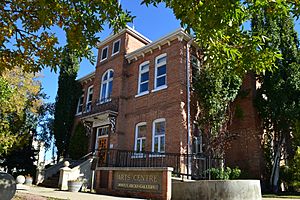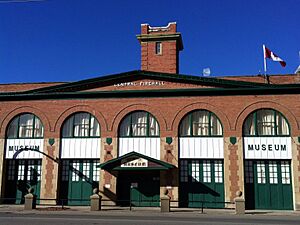List of historic places in Prince Albert facts for kids
This article lists important historic places in Prince Albert, Saskatchewan. These are special buildings and sites that have been officially recognized. They are part of the Canadian Register of Historic Places. This means they are protected because they tell important stories about Canada's past. These places can be protected by the federal government, the province, or the city.
Contents
Discovering Prince Albert's Historic Sites
Prince Albert has many buildings and places that are important to its history. These sites help us understand how the city grew and changed over time. They also show us what life was like for people in the past.
Homes with History
Some historic places are former homes of important people. These houses often have unique designs or stories connected to them.
Diefenbaker House
The Diefenbaker House National Historic Site is located at 246 19th Street West. This was the home of John Diefenbaker, who later became Canada's 13th Prime Minister. He lived here with his first wife, Edna. The house shows what life was like for a rising politician in the mid-20th century. It is now a museum where you can learn about his life and career.
Keyhole Castle
The Keyhole Castle National Historic Site of Canada is at 1925 1st Avenue East. This unique building looks like a castle! It was built in 1911 for a wealthy businessman. The castle gets its name from its unusual keyhole-shaped windows. It is a great example of early 20th-century architecture in Prince Albert.
McDonald Residence
The McDonald Residence at 314 14th Street West is another historic home. It shows the style of houses built in Prince Albert long ago.
Holmes Residence
The Holmes Residence is found at 585 - 19th Street East. This house also has historical value, reflecting the city's past residential styles.
Important Public Buildings
Many historic sites in Prince Albert are public buildings. These places were important for the city's government, law, and daily life.
Former City Hall
The Former Prince Albert City Hall National Historic Site of Canada is at 1010 Central Avenue. This building served as the city's main government office for many years. It was a central place where important decisions were made for Prince Albert.
The Court House
The Court House is located at 19th Street and Central Avenue. This building has been important for justice and law in the community. Many legal cases have been heard within its walls over the years.
Land Titles Office
The Land Titles Office at 350 12th Street East was where official records of land ownership were kept. This was a very important building for people buying and selling property in the early days of Prince Albert.
The Armoury
The Armoury is found at Exhibition Drive and 8th Avenue East. An armoury is a place where military equipment is stored. It also serves as a training ground for soldiers. This building has played a role in the city's military history.
Other Unique Historic Places
Prince Albert also has other interesting historic sites that tell different parts of its story.
Prince Albert Heritage Museum
The Prince Albert Heritage Museum is located at 10 River Street East. This museum is a great place to learn about the city's past. It collects and displays items that show how people lived and worked in Prince Albert throughout history.
Octagonal Building
The Octagonal Building is found on the Exhibition Grounds. This building has eight sides, which makes it very unique! It was likely used for events or displays at the exhibition.
Wardens' Equipment Building
The Wardens' Equipment Building is located in Prince Albert National Park of Canada. This building was important for the park wardens who protected the park and its wildlife. It stored their tools and supplies.
Penitentiary Towers
Several old towers from the Prince Albert Penitentiary are also listed as historic places. These include the North Field Tower, Northern Tower D-1, Southern Tower D-3, Northern Tower D-4, and Southern Tower D-2. These towers were part of the prison's security system. They stand as reminders of the penitentiary's long history in the area.
See also



